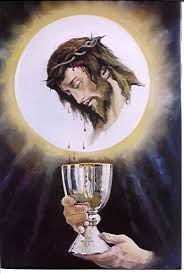
I hate, hate, hate seeing this, and I've seen it all too often (and at which Mass, I wonder?). When our own priests treat the Sacred Species as anything but, how can we possibly expect the laity to think differently?
A reader asks Fr. Z:This morning we got the double whammy. After subjecting us to the “We are the Eucharist” homily, the priest, after moving the Hosts from one ciborium to another, brushed his hands off over the floor (carpeted.) Is there any measure that should be taken in respect to fallen particles?
Fr. Z's response: "Awful."
And I say, it is
much more than awful. It is
sacrilege.
If every single particle, no matter how tiny, of the Sacred Host is the Body, Blood, Soul, and Divinity of Our Lord, whole and entire, then to deliberately scatter the Host all over the floor, to be trampled underfoot, is
sacrilege.
Nevermind the fact that this is happening
all the time where Holy Communion is received in the hand. Particles are inevitably left behind in the palm. Back when I used to receive in the hand, I nearly
always saw particles left in my palm. Even after I licked my palm to ensure none were left, my conscience was always troubled as to whether or not I had gotten every one, until I finally had it and decided to receive on the tongue and solve the problem once and for all.
Most Catholics don't bother worrying about this sort of thing; they dismiss it as "scrupulosity" or a too great focus on God's judgment rather than on his mercy.
To these I say: Nonsense! Rubbish!

If this is "scrupulous", then the Church Herself was scrupulous who, for 1500 years before the Novus Ordo was implemented, would not allow the priest to touch the consecrated Host with anything but the thumb and forefinger, and once Our Lord was touched, the thumb and forefinger had to be stuck fast together and could touch nothing else throughout the rest of the liturgy until they could be purified, for fear that any particles left on the fingers might drop. That meant that turning pages, picking up the Chalice, or handling anything else had to be done with the other three fingers, as awkward or inconvenient as it might have been. Well, modern Catholics are saying, good thing the Church has done away with all that "scrupulosity", eh? And with it has gone wholesale the belief in the Real Presence, for 70% of Catholics today do not believe in it.
These are surely the same people who find utterly foreign the notion that any man would
die to protect the Sacred Host. St. Tarcisius, a mere child, clung to the Eucharist and died from the blows he received rather than give it up to the raging mob. And then there is
this touching story, about the 11-year-old Chinese girl whose martyrdom so inspired Archbishop Fulton Sheen he vowed to make a daily holy hour after her example.
When the Communists took over a little town in China in 1949, the soldiers imprisoned the priest, who watched in horror from his cell as they rushed into the church, broke into the Tabernacle, and scattered the consecrated Hosts all over the floor. He knew the exact number of Hosts he had left in the ciborium: 32. And each night, he observed how one little Chinese girl from the parish, alone, snuck into the chapel, made a holy hour, and then knelt down and, with her tongue, picked up one Sacred Host and received it. This continued each night for 32 nights--and on the last night, after receiving the last Host, she accidentally made a noise, waking the guard, who proceeded to beat her to death with the butt of his rifle.
Fast forward half a century, and we see priests handling the Host like potato chips, brushing off the "crumbs" onto the floor, or wiping their noses with the same hands that have just touched the consecrated species. This is frankly one of the reasons I could not bear to continue attending the Novus Ordo anymore; it was wrecking my faith to see the very men ennobled to call down Our Lord from Heaven into a humble piece of bread treating that same Lord with such abject carelessness--and allowing parishioners to treat Him in the same way, saying nothing to them for fear of offending. How could they possibly
believe, I wondered? Preach on the Real Presence all you want, but if you yourself treat it as if it were not Real, then your words ring hollow.
I once heard of a woman who had doubts about the Real Presence, and she wondered whether or not her parish priest truly believed. So one day she decided to stay behind in the chapel after Mass to observe how the priest himself behaved. She hid behind one of the back pews, and observed the priest, who believed he was alone. Without fail, each time he passed before the Tabernacle, he genuflected. She left knowing precisely what he believed--and her own faith was strengthened thereby.
This is not about scrupulosity, or about a focus on God's judgment rather than His mercy. Of course God is merciful; if we unwittingly drop particles of consecrated Host on the floor, He will forgive--in the same way, perhaps, that a mother will forgive her neighbor for accidentally dropping her infant on the floor! Yes, there is forgiveness--but that forgiveness doesn't diminish the gravity of the offense. Should we not do ALL in our power to ensure that such desecration
never takes place, unwittingly or no? And if not,
why not? Are we so complacent, so lax, so
lacking in love (for that is really what it is) that we simply can't be bothered? This is not about, as some Catholic bloggers have said, an "über-obsession" with communion in the hand, or the difference between a preference for chocolate versus some other flavor. (Heavens, I can't believe I even read such lines from such a well-known Catholic apologist--who shall remain nameless.) This is about sacrilege, pure and simple, and the negligence and complacency of too many in the church today--including clergy--who are seemingly indifferent toward our Eucharistic Lord.
In the last, what it comes down to is
love--not ideology, not politics, not sectarianism or any of that other nonsense that the unthinking or complacent dismiss such concerns with with a roll of the eyes. It comes down to
love. Do we love? And if we love Christ with all that we have, does He not deserve to be treated as most precious, most sacred, to be held in highest reverence and honor?
 Explaining the reasons for your commands.
Explaining the reasons for your commands.

 Fr. Chad Ripperger, FSSP, whose site
Fr. Chad Ripperger, FSSP, whose site 



 As much as I respect Dr. Edward Peters, I find his
As much as I respect Dr. Edward Peters, I find his  Hilaire Belloc, that giant of the faith, was the single most influential Catholic man in his day in England. Chesterton only rose to prominence after the fact, and actually attributed much of his understanding of the faith to his friendship with "Hilary". In his time, it was Belloc who led the charge. This was a man who wore his Catholicism on his sleeve at a time when it was not only terribly unfashionable to do so, but could result in discrimination and unfavorable treatment at school and at work. Remember, it was turn-of-the-century protestant England in which he lived, where only a few years previous a man couldn't even attend Oxford University without swearing an oath to uphold the 39 Articles, and where the Act of Supremacy remains in force to this day. English Catholics went about their lives quietly, fully aware of their minority status, in general not wishing to ruffle feathers or draw attention to their perceived "superstitions." Not so Belloc. He roared like a lion, and instead of taking the timid and defensive posture of so many Catholics of his day, took the offense, challenging revisionist Protestant history in book after book and debate after debate.
Hilaire Belloc, that giant of the faith, was the single most influential Catholic man in his day in England. Chesterton only rose to prominence after the fact, and actually attributed much of his understanding of the faith to his friendship with "Hilary". In his time, it was Belloc who led the charge. This was a man who wore his Catholicism on his sleeve at a time when it was not only terribly unfashionable to do so, but could result in discrimination and unfavorable treatment at school and at work. Remember, it was turn-of-the-century protestant England in which he lived, where only a few years previous a man couldn't even attend Oxford University without swearing an oath to uphold the 39 Articles, and where the Act of Supremacy remains in force to this day. English Catholics went about their lives quietly, fully aware of their minority status, in general not wishing to ruffle feathers or draw attention to their perceived "superstitions." Not so Belloc. He roared like a lion, and instead of taking the timid and defensive posture of so many Catholics of his day, took the offense, challenging revisionist Protestant history in book after book and debate after debate. 

.jpg) Dietrich von Hildebrand's
Dietrich von Hildebrand's 
 Brianna
Brianna

